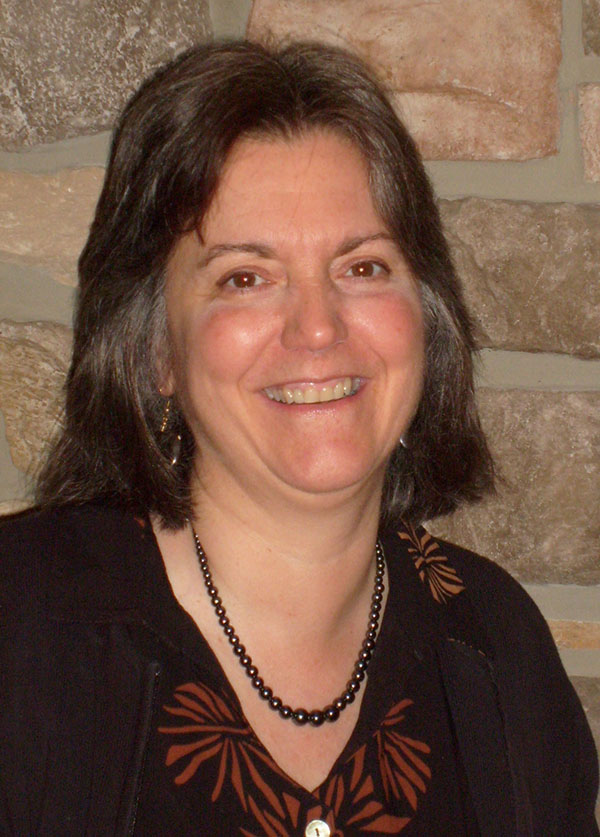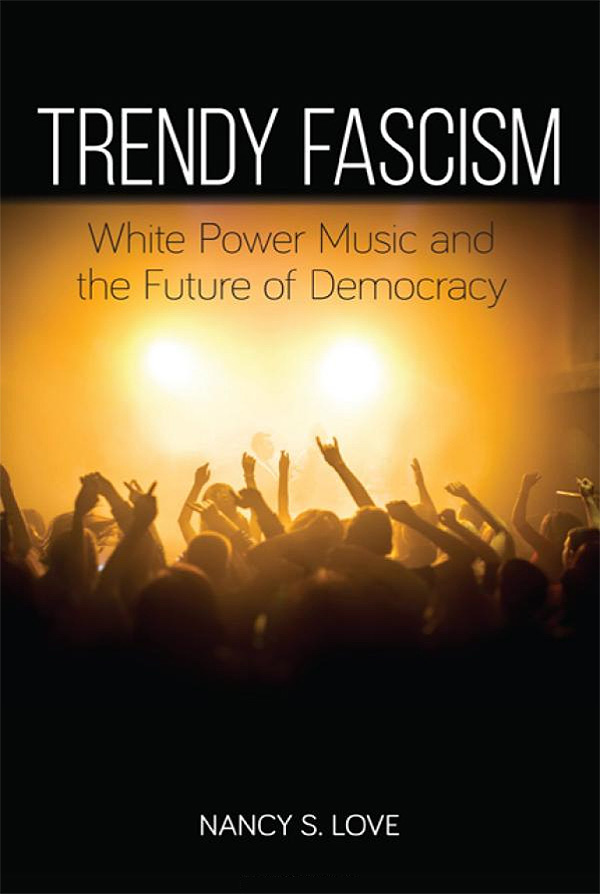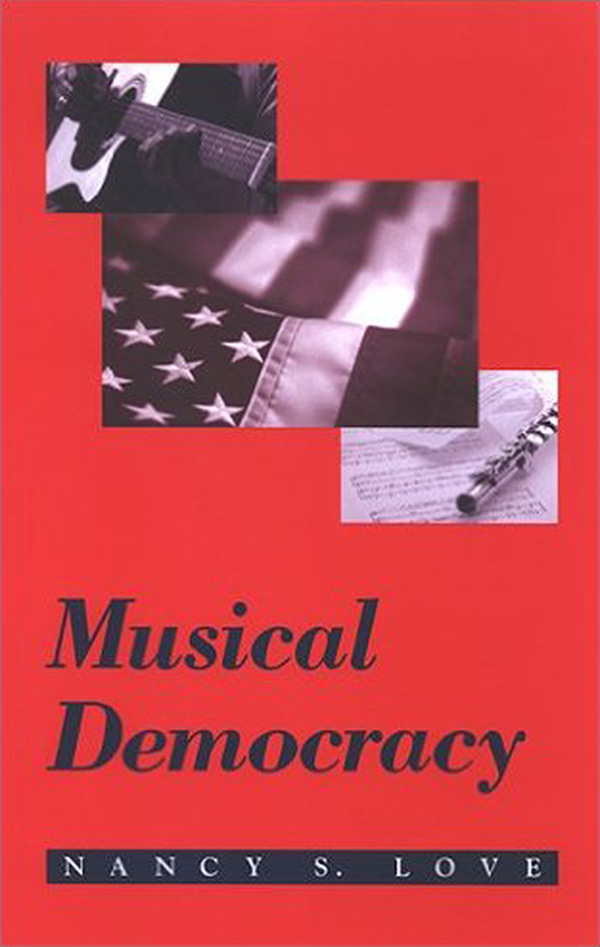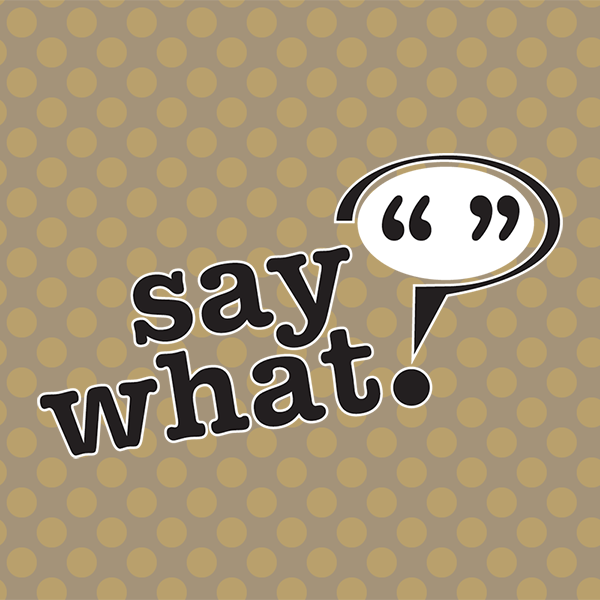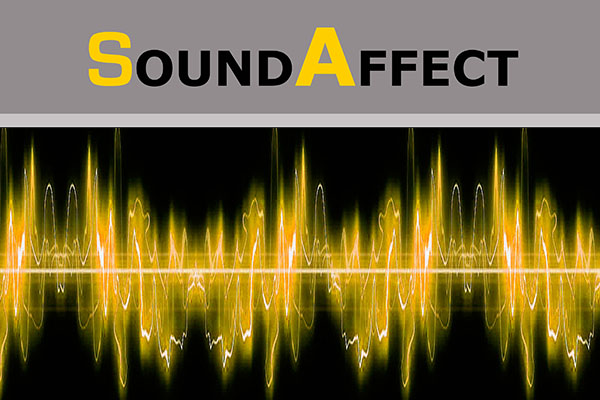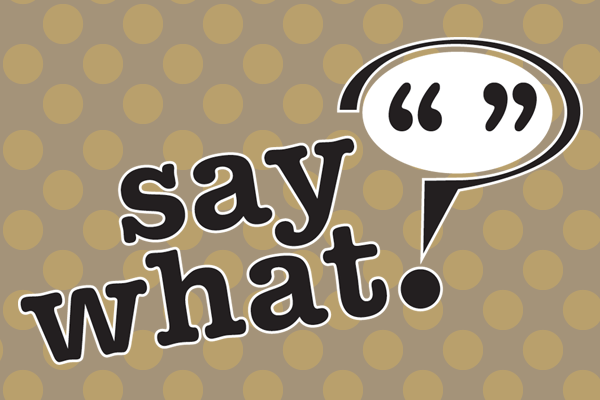Conversations with smart people about stuff that affects our world, and how we affect it
Dr. Nancy S. Love is a professor in the Department of Government and Justice Studies at Appalachian. She joined the department in 2009 and is also a faculty affiliate of the university's interdisciplinary studies and women's studies programs. An award winning teacher, she offers classes on political theory and political ideologies. Her teaching and research emphasize political theory, especially critical, democratic and feminist theory. Dr. Love is the author of Trendy Fascism: White Power Music and the Future of Democracy published by SUNY Press in 2016 as well as Musical Democracy, Understanding Dogmas and Dreams: A Text, and Marx, Nietzsche, and Modernity.
Transcript
Nancy Love: The worry with this particular music is yes there’s a right, but that doesn’t mean that what’s done with it is right. Yeah, and so what I try to do is by presenting students with some of the messages in these lyrics and asking them to really think about it, to say alright this is your judgment call as a citizen of a democracy what do you think contributes to our community and do you want to be a part of it.
Troy Tuttle: From Appalachian State University in Boone North Carolina, this is SoundAffect. Here’s your host, Megan Hayes.
Megan Hayes: Dr. Nancy S. Love is a professor in the Department of Government and Justice Studies at Appalachian. She joined the department in 2009 and is also a faculty affiliate of the university's interdisciplinary studies and women's studies programs. An award winning teacher, she offers classes on political theory and political ideologies. Her teaching and research emphasize political theory, especially critical, democratic and feminist theory. Dr. Love is the author of Trendy Fascism: White Power Music and the Future of Democracy published by SUNY Press in 2016 as well as Musical Democracy, Understanding Dogmas and Dreams: A Text, and Marx, Nietzsche, and Modernity.
She's also the editor of Dogmas and Dreams: A Reader in Modern Political Ideologies, 4th Edition, and the co-editor of Studying Politics Today: Critical Approaches to Political Science and Doing Democracy: Activist Art and Cultural Politics. She's also published numerous articles in prominent journals and contributed invited chapters to multiple edited volumes. She recently completed a six year term as the co-editor of New Political Science: A Journal of Politics and Culture.
Dr. Love earned her bachelor's degree from Kenyon College and holds masters and PhD degrees from Cornell University. Dr. Nancy Love, welcome to SoundAffect.
NL: Thank you so much. Good to be here.
MH: So glad you're here. You are the first of several guests who are going to be joining us over the next few days to talk about speech and how we can balance the right to freedom of speech with the responsibilities that we as individuals have for the speech that we use. In your case you explore language in music. I'm curious about this because you're a political scientist, so how and why did you end up studying music?
NL: Yeah, two reasons. First, I am an amateur musician, so music is one of my passions. This was a chance to integrate that with my scholarly work, but more important in terms of my scholarly work, I'm a political theorist, and I started to notice how frequently people writing about politics use musical metaphors. I would argue that voice is even a musical metaphor, but perhaps more important talking about democratic processes in terms of harmony or dissonance, concord or concert, amplifying the voice of the public, the public sphere being resonant and vibrant. I thought what if we take those metaphors seriously and start looking at how music and politics come together in places like campaign theme songs, protest music, anthems, those kinds of musical expression?
MH: What do you play? Sorry, just curious.
NL: I play piano and I studied voice for years.
MH: Oh great. Your latest book is called Trendy Fascism. What is trendy fascism and how does music play into that?
NL: Sure. The trendy fascism part I called it trendy because I'm talking about a phenomenon that is fashionable, up to date, but not just a fad. It's a longer term trend that has significant implications for shaping culture. Then the fascism part, a lot of people have talked about the rise of the radical right in American and European politics as populism, even authoritarian populism, but I use fascism because some of these groups have direct connections to neo-Nazi and also KKK groups, but they're not organized like classical fascism in Germany or in Italy under Hitler, Mussolini. It's not top down. It's not state centered. It's much more grassroots. The terms that often are used, they're cellular networks. People engage in swarm behavior. They appear on the streets, make trouble and then disappear back into private spaces often online.
MH: Your book Trendy Fascism explores this niche of white supremacy, particularly how contemporary white supremacists use popular music to teach hate and promote violence. Can you talk about some specific examples of when this has taken place?
NL: Yeah I can unfortunately. A couple of recent ones, 2012, Wade Michael Page who was the Sikh temple shooter played in multiple white power bands and was also radicalized online. He was frequenting white power websites, and there's often a connection between playing in the bands, listening to the music, and reading the messages online. He was involved in a band Blue Eyed Devils, Definite Hate, End Apathy.
Another example which is ongoing, Paul Craig Cobb who tried to start an intentional white community. They called them Pioneer Little Europe communities, and this is part of the attempt to create a global network, but he tried to start one in Leith, North Dakota. Cultural politics is a big part of these communities. They specifically recruit artists and musicians. His community ultimately failed. He wound up being convicted and jailed for a terroristic threats, and there was significant community activism opposing hate that made it impossible for him to recruit white supremacists to take over this town, but he hasn't stopped. He's now moved on to another community in Nebraska that he's trying to organize.
Maybe my most interesting example because it has a more positive outcome, George Burdi, who was one of the founders of Resistance Records and a lead singer for a band called RaHoWa, Racial Holy War, got arrested for kicking an anti racist activist who was attending one of his concerts. Jail time transformed him. He was forced to confront himself and his actions. He decided to renounce his former racism and became a founding member of an organization that helps white supremacists who want to leave the movement, find their way out called Life After Hate.
MH: Wow.
NL: Yeah.
MH: In some countries, and maybe this is just me noticing this, I feel like governments pay quite a bit of attention to the role that music plays in mobilizing people to get involved in political causes. I haven't noticed that as much in the US. Is that just me? Do you think that's true or why do we or don't we do that?
NL: Yeah. I think First Amendment protections, right, for artistic expression and then these groups in some cases claim religious expression as well. They're claiming to be founding a white racial religion. I think that there's been a tendency to separate culture and politics and see culture as private and politics as public. Culture is sort of the realm of individual choice, taste, and maybe judgment, but that fails to recognize the power that music has to mobilize people. Historically music played a major role in the Civil Rights Movement. That's probably the example that most people would think of and songs like This Little Light of Mine, We Shall Overcome that are forever associated with mobilizing a movement.
MH: Sure, yeah.
NL: but the role that music plays, it's a really powerful mnemonic device. I think all of us have had the experience of learning counting songs or alphabet songs. These movements have used music to convey their message, but also hold their message in our memories because music is stored in and it affects the most primitive parts of the brain. People will also remember the associations with the song even after they may have forgotten the lyrics. It isn't just speech set to music.
MH: Right.
NL: Yeah, it sounds that have the effect as well. That's not seen typically as political speech or as political message, but it is.
MH: It's almost like when you remember a smell from childhood like something cooking or something like that and it brings something back.
NL: Yeah, exactly. That whole set of associations.
MH: How can we identify where the line is crossed over from this right to freedom of expression and the cultural side using an art form to really incite violence?
NL: Well, it's hard, right? I'm not an attorney. I'm also not a legal scholar, so I need to be careful in terms of my expertise in that terrain, but there are studies that show that particular kinds of music, loud volumes, rapid rhythms, ascending notes have effects on the brain body connection. By tapping into primitive parts of the brain, aggressive music can trigger aggressive thoughts and those can be translated into aggressive action, so people get amped up on the music and then do things that they might not otherwise do.
When that musical experience is a part of a group bond as well, there's a term for that, muscular bonding, and it's used in the military and in churches. It's something probably lots of people have experienced on dance floor, but that can translate into group violence in the streets.
MH: I was thinking about preparing for this podcast and remembering this experience I had when I was a kid. It relates somewhat to what you're saying. It's different, but in terms of just paying attention to what's going on with music. I think it was 1982, and I'm listening to Billy Jean by Michael Jackson at top volume. I'm singing it at the top of my lungs. My dad comes in my room, and he's like "Why are you singing this song? These lyrics are terrible." I was like "Oh Dad. It's Michael Jackson. Everybody loves Michael Jackson. They can't be terrible."
He had this conversation with me that I totally did not want to have at age 11 about the lyrics and what they mean and how we really need to be thinking about the lyrics of the song. That still sticks with me to this day. I have to say I still love the song, and I still like to groove a little bit to Michael Jackson, but that made me think about how he never really let me off the hook for that, right? Even now when I think of this song, I take this next step to think about the lyrics and what those lyrics really mean.
While I love the way the song sounds, I found myself saying to my kids, "I really do like this song, but I really don't like the lyrics, so let's think about those." What do you think about how we can talk to young people about that? I was a middle schooler, but talking about teenagers, twenty somethings, What are the kinds of things that we can do that aren't PMRC type things where we just need to say you can't listen to this or you shouldn't listen to this, but to get people to really think critically about the music experiences that they're having?
NL: That's really important. Some of the former white power musicians who are now involved in Life After Hate have talked about how in listening to the music or singing along with the music you're actually rehearsing hate. To do that unconsciously is really problematic. From my perspective censorship isn't the answer. You mentioned PMRC, so then we're talking about some sort of warnings ...
MH: Right. Yeah.
NL: ... but this music is so readily available online now. As a result of an investigative report by the Southern Poverty Law Center iTunes recently decided to remove a lot its white supremacist themed music, but it's still available elsewhere.
MH: Sure.
NL: Easily available on Amazon. What I argue for is people educating themselves about the messages that the music is spreading and deciding whether they want to be a part of that and participate in that. My argument is that citizens in a democracy need to be aware of the cultural messages as well as the political issues because those cultural messages often undergird and support the political issues and the candidates who are espousing them.
MH: I think it's really interesting to think about how important freedom of expression is in a democratic society because in order to have a democratic society, you really have to have all these viewpoints at the table, right?
NL: Yeah.
MH: The other side of that is those viewpoints are not always going to agree, so you have people at the table saying that is hurtful, that is wrong, you shouldn't say that, and other people at the table saying I have every right to say that. That is democracy. When we don't do that, democracy is threatened, and yet when we don't acknowledge there is oppression in language, then democracy itself is threatened. This is this squishy area where critical thinking in my mind is really important.
I also feel like this is also where higher education has to be there to challenge society to take that next step to go beyond those sound bytes and those quick little things that we look at and listen to in the media and obsess over and really dig deeper into thinking about that. Go beyond the convenient narrative and really start talking about what's actually happening and what that means when we have those conversations.
That's super easy for me to say. I'm not sure it's so easy to do. I know this happens everyday in the classroom. I know it happens in your classroom. I know it happens in our colleagues classrooms. Can you talk about how you're doing this in your work and how you seen your colleagues do this as well?
NL: I think you're making a really important argument about the need to have everyone at the table and to have all views expressed in order for a democracy, not just to function, but to thrive. The worry with this particular music is yes there's a right, but that doesn't mean that what's done with it is right.
MH: Sure, yeah.
NL: Yeah. What I try to do is by presenting students with some of the messages in these lyrics and asking them really to think about it, to say, all right, this is your judgment call as a citizen of democracy, what do you think this contributes to our community and do you want to be a part of it?
Now I define hate music very specifically. It's music that targets an historically oppressed group whether through stigmas, stereotypes and sometimes explicit calls for violence. Then it's music that is racist, misogynist or alter nationalist, but I also say to the students some of these messages spill over into more popular music genres, so we can't just compartmentalize this as fringe.
MH: Right, right.
NL: Because it's a part of our culture and to allow it to flourish in hidden spaces or to try to shut it down through censorship isn't the answer. What we need to do is work to become more aware of it and of its effects and then decide how we want to exercise our judgment as responsible citizens of the democratic community. Those are the conversations that I try to have. I show them examples and we discuss them.
MH: It sounds like having an established definition, working definition, that you can use to, I guess as a jumping off point for the conversation can be really helpful in that regard in terms of this is how we're defining this. Given the constraints of how we in this conversation are going to define this, let's then look at examples of where we're seeing it in other places. It almost seems like creating that space allows you to move beyond other confines that might be established already around that conversation. Does that makes sense?
NL: Yeah, it makes a lot of sense. There are genres that are associated with particular groups. People have political associations with country music, with folk music, also with rock and roll, and so it opens up the possibility of talking about how musical genres as well as musical lyrics are presumed to communicate certain messages, but do they really and what do we want to say and to share?
MH: Yeah, I think that's also really important in terms of just I guess getting back to the convenient narrative piece because I think it's really important to emphasize that what you're saying is not this music or this type of lyrics, these characteristics of hate music are everywhere and so we should not listen to music anymore. Rather than we should just not listen to anything, which seems like would be a natural conclusion people might jump to, instead you're saying listen to everything, just listen to it with all of your mind and with all of these different conversations in mind.
NL: Yeah and know the effects that it’s having on you as a listener as well as on others who are listening to it. Those effects, yes, they're on your mind, but they're also in your emotions because listening to angry music can make you angry. Listening to sad music can make you sad. Then there are also effects on your body, heart rate, blood flow. Music is a really powerful medium for mobilizing people for any number of activities.
MH: Yeah. When you were saying that, I was thinking of my favorite songs I like to run to, so that definitely makes a lot of sense.
NL: Yeah.
MH: Well, is there anything that I have not asked you about that you want to make sure that you cover in this conversation today?
NL: Well, I guess the only other thing that I would mention is that this is especially important now, which is why I really appreciate us being able to have this conversation because our politics is increasingly fragmented and polarized. There is a rising tide of hate speech in the United States. I think it's important for us as citizens to be aware of that and not to run from it, to inform ourselves and to act in ways that we think express who we are as a people. That's a much more diverse people than the messages of this white power music would suggest.
MH: I'm so glad you said that. Thank you so much because I think that's exactly what we at Appalachian are trying so hard to figure out how to do. We're a mini city here, about 21,000 people all trying to figure out where we fit in life especially for the ones that are between the ages of 18 and 22, making some really significant decisions about who they are and what they want to do next. Certainly as someone who's been on this campus for almost two decades, I find myself in a different place, but having those same conversations. How can be a constructive part of this conversation, which can be very difficult to have.
When we have instances of any kind of speech that incites people to have intense conversations, whether it's hate speech or because I think there's so many definitions of that, then again that would be one of those where we'd have to establish what we're talking about when start to move on and have that conversation, but anytime there's any sort of injection into this population that gets people very passionate, we need to understand as a community how we're going to respond to that passion and what we're going to do. We're figuring that out. You being here is a really important part of figuring that out. Tapping into our expertise that's right here on campus is so important to that.
NL: Well, thank you so much.
MH: Let me ask you one additional question and this relates to the use of music particularly in political campaigns in the United States. One of my colleagues had mentioned that he has noticed in particular with the Trump campaign, attending a Trump rally, and then afterwards seeing him in different settings what appeared to be incredibly intentional use of music choice for those settings. Is this something that's new to us in America or just something we're noticing more now because we're paying more attention to those kinds of things?
NL: Yes and no. It's new as I think a conscious strategy that micro targets particular audiences, but music has been used in campaigns since the 1840s. It just used to be handing song sheets at rallies. Now it's typically borrowing songs from popular performers that have the associations that the candidates want for the audience at hand. Where it really took off was 2008 with former President Obama's campaign and will.i.am's Yes We Can, which I think will be forever associated with that campaign, but Hillary Clinton has also crowdsourced and asked her constituents to choose songs for her.
In this last campaign, I think Katy Perry's Roar was the most popular song for Clinton, but then there's also been push back from artists who didn't want their songs borrowed or stolen by the candidates with whom they didn't necessarily associate their own political views. Bruce Springsteen in particular who's Born in the USA was borrowed by the Regan campaign really protested that. Queen was suing Donald Trump for borrowing one of their songs, so it's a complicated phenomenon, but it's increasingly prominent. I think it's with us for the political future of campaigns.
MH: Dr. Nancy Love, thank you so much for taking the time to talk with me here today. I look forward to hearing you share your research and your expertise with our campus during the speech summit taking place at the end of March. My hope is that by spending some time with us here today we'll be able to extend these conversations not only throughout next week, but also further on into time and hopefully beyond our campus as well. Thank you so much for taking the time to come in and speak with me today.
NL: Well, thank you very much. It's been a pleasure.
MH: Today’s show was written and produced by Troy Tuttle, Dave Blanks and me, Megan Hayes. Our sound engineer is Dave Blanks with assistance from Wes Craig. Our web team is Pete Montaldi, Alex Waterworth and Derek Wycoff. Research assistance comes from Elisabeth Wall and video and photo support come from Garrett Ford and Marie Freeman. Our theme song was written and performed by Derek Wycoff of Naked Gods. Our podcast studio is dedicated to Greg Cuddy and a special thanks to Stephen Dubner for inspiration, advice and moral support. SoundAffect is a production of the University Communications team at Appalachian State University in Boone, NC. Thanks for listening. For SoundAffect, I’m Megan Hayes.
What do you think?
Share your feedback on this story.
Listen to podcasts recorded during the weeklong series of events held in March, 2017
Conversations with smart people about stuff that affects our world, and how we affect it
About Appalachian State University
As a premier public institution, Appalachian State University prepares students to lead purposeful lives. App State is one of 17 campuses in the University of North Carolina System, with a national reputation for innovative teaching and opening access to a high-quality, cost-effective education. The university enrolls more than 21,000 students, has a low student-to-faculty ratio and offers more than 150 undergraduate and 80 graduate majors at its Boone and Hickory campuses and through App State Online. Learn more at https://www.appstate.edu.

